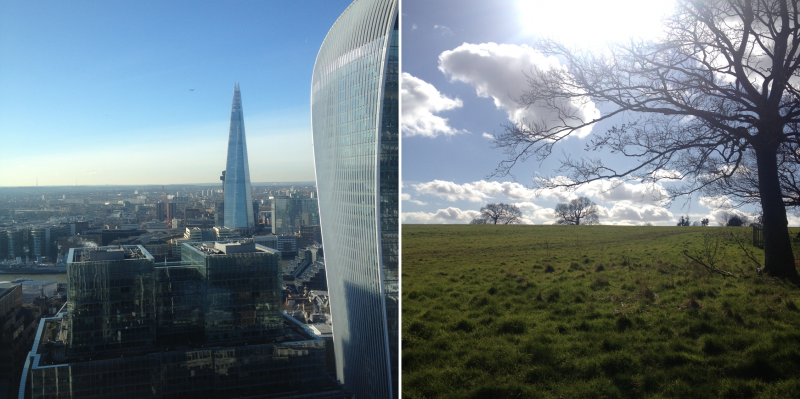
- 21 Mar 2016
This blog was first published on 14 March 2016 at https://prueaddison.wordpress.com/2016/03/14/valuing-nature-business-imp...
Recently I had the unique opportunity to attend the Valuing Nature Business Impact School in London. The school brought together early career scientists and business representatives, who share a common interest in valuing nature both for its’ intrinsic environmental value and to understand its’ benefits to business, government and broader society.
The school was run by the Valuing Nature Programme and was held in two contrasting venues: in the heart of London’s business district, and in Windsor Great Park. These settings stimulated some great discussion around how scientists and businesses can work together to effectively value nature, through approaches such as estimating ecosystem services, biodiversity and natural capital. There is a great Storify blog that summarises a lively Twitter discussion during the school.
Having recently commenced a NERC knowledge exchange fellowship working with businesses on their corporate biodiversity strategies, the school was a perfect forum for me to learn from other scientists and businesses working in this field. There are so many things I learnt from the Business Impact School, but here are the top four lessons that resonated with me:
1) Why scientists value nature
In his welcoming speech, Michael Winter articulated why scientists should get involved in valuing nature. He summarised the negative response to valuing nature from parts of the scientific and conservation community, who claim that the scientists working in this area have ‘sold out’ to business. But the reality is that businesses and governments are keenly interested in pursuing ways to understand and value nature, and are pushing ahead with this agenda regardless of scientists’ involvement. By acknowledging this reality, scientists have an opportunity to work with business to develop evidence-based, scientifically rigorous approaches to improve the way that nature is valued by businesses. Why should scientists do this? So that we can factor the environment into effective decision-making in the future!
2) Why businesses value nature
As a conservation scientist who has recently begun working with businesses, it’s been a steep learning curve for me to understand what motivates businesses to value nature in the first place. Some interesting perspectives were shared at the school, and with some further reading I feel I’m starting to get my head around these motivations. At the end of the day businesses need to make a profit and a return for their owners/shareholders. So what financial benefits can businesses gain from working with nature? The World Resources Institute outline the financial incentives for businesses to work with nature as:
Operational – investing in environmental initiatives to support more efficient operations.
Regulatory & legal – demonstrating environmental leadership to influence the development of policies & regulations, that could in turn provide ecosystem services that a business relies on.
Reputational – communicate environmental initiatives for differentiation from competitors, and to connect with staff, shareholders, customers and broader society.
Market & product – brand differentiation, by offering eco-labelled products or more sustainable services to reduce environmental impacts.
Financing – gaining access to favorable loan terms from banks who support businesses engaged with positive environmental initiatives
3) How can scientists work effectively with businesses to value nature?
One thing that struck me during the school is that many scientists are conducting research that could be really beneficial to businesses. But many scientists are yet to connect with specific individuals in businesses to ensure that their science is applied to address business needs. We discussed this briefly at the school, and that a vital initial step is to identify who are the ‘end users’ of your science in order to begin to work with businesses. Often we need to identify the champions within a business, who are passionate about the environment and your science, who can facilitate your research having a real impact in the business world. So how can scientists identify these businesses and individual champions?
Fortunately, Mark Reed and his colleagues have done a lot of research in this area, and have some great tips on the art of knowledge exchange and how to achieve impact in your research. He also has a great online online course available, which guides scientists through designing their research to achieve impact, identifying the end users of research, and recommending ways to engage with these end users.
4) A top tip for communicating with business
Let’s face it, scientists have a pretty special way of communicating, which is full of technical jargon that often only other scientists can understand. Peter Young, the chair of Valuing Nature’s Business Interest Group, gave a very simple piece of advice for scientists wanting to communicate effectively with business: learn the language of business by looking at their websites. Just mirror their language back to them when explaining your science. Simple!
Thanks Valuing Nature Business Impact School!
I’d like to thank the Valuing Nature Programme for organising the Valuing Nature Business Impact School. This program offered fully funded places to 25 PhD and early career scientists, and was a fantastic learning and networking opportunity for all attendees. This was the first year of the school, and I’m sure there will be many great years of the school to come. For those early career scientists keen to join the next Business Impact School, you should join the Valuing Nature Network!
